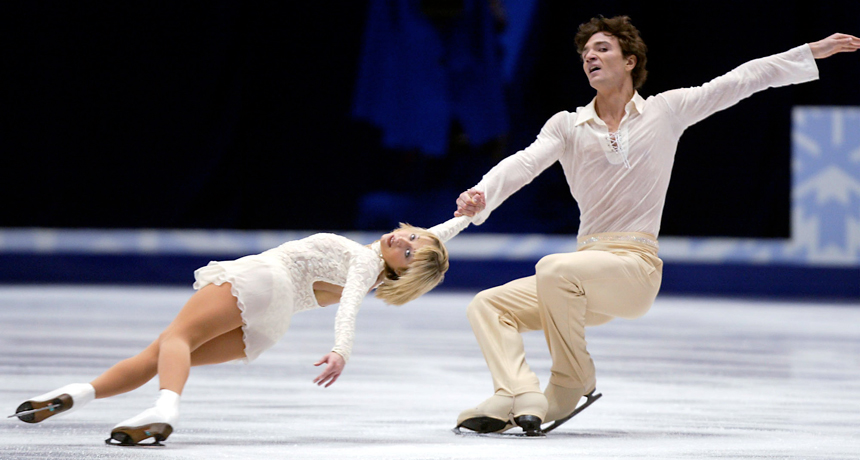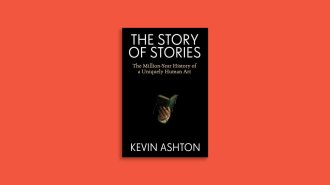Figure skating judges get a 10 for duplicity
Scoring reforms after 2002 actually increased favoritism and dirty deals

CONTESTED CONTEST Allegations that a handful of judges agreed beforehand to rank this Russian figure skating pair first at the 2002 Winter Olympics in Salt Lake City influenced later scoring reforms. Those reforms have backfired, a new study finds.
Associated Press
At the Winter Olympics in Sochi, Russia, figure skating judges’ impartiality may tumble hard to the ice.
Judges’ tendencies to jack up scores for performers from their own countries and to arrange mutually beneficial vote exchanges among themselves have actually increased following scandal-inspired rules changes about a decade ago, says economist Eric Zitzewitz of Dartmouth University.
At the 2002 Winter Olympics, five judges allegedly arranged to rank a Russian figure-skating pair first in exchange for the Russian judge giving high scores in other skating events to athletes from the colluding countries. In response to that and other judging scandals, the International Skating Union decided to stop reporting which member of a judging panel issued which score. Anonymity was seen as a way to discourage vote trading.
But the reverse occurred, Zitzewitz says. Favoritism toward skaters from one’s own country and vote trading jointly increased by about 20 percent after judges went incognito, Zitzewitz reports in the February Journal of Sports Economics. Although that’s not a statistically significant rise relative to corruption levels observed in 2002, it’s potentially enough to alter the results of a close competition, he says. Analyses of scoring at future major skating events, preferably with judges’ identities revealed, can address that possibility.
Zitzewitz previously estimated that in the 2002 Winter Olympics, figure skaters moved up about two places in the final standings if a judge from their home countries sat on the scoring panel. Making judges’ votes secret in winter games held since 2002 further increased home-country favoritism, he says.
Zitzewitz recommends reinstating public disclosure of each judge’s scores. If the sport provided an easily accessible database, independent researchers could check for signs of bias and corruption, he adds.
A statistically savvy review committee would help keep judges honest, comments Yale University statistician John Emerson. “An external review board couldn’t be worse than our current situation,” he says.
Zitzewitz analyzed judging data from major figure skating championships and events, including the Olympics. Pre-reform data covered 16 competitions from 2000 to 2002. At that time, judges’ identities were posted and majority rule determined skaters’ placements.
A second dataset covered 23 events from 2002 to 2004, in which judges’ identities were kept secret. Scores of several judges on each panel were dropped at random to discourage vote trading.
A third data set consisted of 107 events from 2003 to 2009. Further rules changes included having judges combine objective ratings of the difficulty of a skater’s program with subjective scores for skating skills and other aspects of a skater’s performance.
In the pre-reform sample, Zitzewitz found that judges tended to give higher scores to competitors from their own countries. Skaters also benefited when a judge from their own country sat on a panel at the same event for a skating competition other than their own, an indirect sign of vote trading.
After 2002, skaters’ scores rose further when they were judged by panels that included a compatriot. Skaters also continued to benefit at events where judges for competitions other than their own included someone from their homeland. In the new analysis, Zitzewitz’s measure of voting bias combines national favoritism and vote trading.
Selection procedures for Olympic figure skating judges need to change, Zitzewitz adds, perhaps taking a nod from another judged sport: ski jumping. Those judges, which were selected by ski jumping’s central committee for the 2002 Olympics, displayed virtually no home-country bias, he says.
But in figure skating, national federations concerned with seeing their own athletes win select judges.







